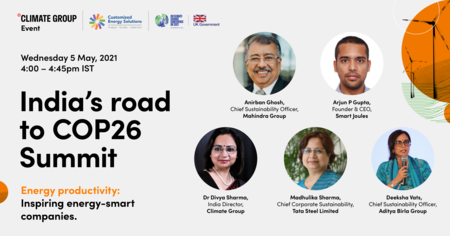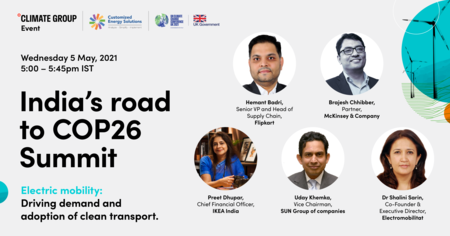India is facing the hardest time amid the second wave of COVID. In the last few years, the country has experienced severe climate disasters such as extreme heatwaves, floods, and swarms of locusts, to name a few. While the country takes a beating on its economy and health, India is also witnessing signs of fierce resilience in our systems, and a readiness for change - paving the way for the coming decade.
On May 5th, 2021, forward-looking Indian businesses, experts from the industry, and senior leadership from policy came together to discuss the critical role of corporate climate action in India at the first in a series of three events of India’s Road to COP26 Summit. This, amid one of the most severe impacts of the pandemic being felt across the country.
Companies came forward demonstrating their persevering commitment to climate emphasizing that –
Indian businesses understand their role and are ready to lead, invest and collaborate for bolder climate action and inclusive low-carbon development – in the lead up to COP26.
These business commitments are particularly exceptional given the recent global net-zero roadmap proposed by the International Energy Agency (IEA) despite the pushback it received from some major economies. While government policy may vacillate, businesses can play a significant role in delivering fast action by opening investment in new technologies. Indian corporates are complementing government policy already.
At the event, Minister Prakash Javadekar of the Ministry of Environment Forest and Climate Change said,
“The Indian corporate sector has been at the forefront in taking a voluntary commitment to climate action. I am happy that so many Indian business conglomerates have accepted low carbon pathways for the development of India. Such voluntary actions will help India overachieve what was promised under the Paris agreement.”
The event was a pivotal moment for the Climate Group’s business initiatives in India. RE100, EP100, and EV100 are seen as powerful and credible pathways for Indian businesses to take bold commitment and action, scaling up efforts on renewable energy, electric transport, and industrial efficiency. While many companies have already signed up to one or more business initiatives, we called to the entire business fraternity in India to place sustainability at the heart of their operations.
Dr. John Murton, UK’s COP26 Envoy gave a special address, bringing to attention the value of our business initiatives in driving green growth in India.
Leading heavy industry companies make exceptional voluntary commitments, join three of the Climate Group’s initiatives
Dalmia Cement and JSW Cement – two leading Indian cement companies - committed to the Climate Group’s flagship business initiatives RE100, EV100 and EP100. Dalmia Cement committed to EV100, while they are already members of RE100 and EP100. JSW Cement, committed to all the three campaigns in one go.


Globally, no heavy industry company has committed to all three of Climate Group’s business initiatives. As part of Dalmia Cement and JSW Cement’s EV100 commitment, both companies have made an exceptional voluntary commitment to electrify a portion of their heavy-duty vehicles (vehicles weighing more than 7.5 tons) going above and beyond the minimum commitment criteria of EV100 on light-duty vehicles.
Click here to watch the opening ceremony of India’s Road to COP26 Summit.
Voices from businesses
What we heard from businesses at the summit was a resounding acceptance of shared responsibility towards climate action.
Businesses know that a significant part of their operations are extremely carbon-intensive and while they focus on markets and offering novel products and services, they must rethink the way they do this.
Energy, transport, and industrial efficiency are critical sectors to drive deep decarbonisation as India witnesses growing technical capabilities in these areas. With strong political backing, unwavering investment, and a propensity for innovation and change, we can offer a safe future even in the most uncertain times. Business support will remain key.
We heard this from the three following sessions that focused on clean energy, energy productivity, and clean transport.

Session #1: Raising ambition on accelerating a clean energy transition
Click here to watch the full session.
While domestic and global players are thrilled by the pace of India’s clean energy sourcing, including the propensity to overachieve the 450 GW goal, we know that a transition in a sector as large and demanding as this will be a big task.
At the session on clean energy, we heard from experts and businesses on the priority areas critical to the dual implementation of sourcing and use of clean energy, thereby bringing down coal-induced carbon emissions drastically. Some priority areas are:
- Maximising the direct use of renewables
- Continuing to increase demand ecosystems for renewables, and use of hydrogen
- Policy support by national and state governments and
- Collaborations on R&D between investors, technical experts, and governments
Anish De, National Head of Energy and Natural Resources at KPMG said,
“My prescription would be to develop the right kind of demand ecosystems that can absorb clean energy and hydrogen alternatives. We need an honest policy in India to drive our transition away from coal.”

Session # 2: Inspiring energy-smart companies
Click here to watch the full session.
At the session on energy efficiency, we saw that large and influential businesses see energy efficiency measures not just as a way to reduce their emissions, but also as a way to significantly bring down the costs of their operations. This win-win situation for companies makes energy efficiency and productivity the simplest, and most fundamental aspect of any business.
While big industries and corporations have already adopted energy efficiency measures bringing novel technologies to the market, in India it is crucial for this to spread across supply chains and public and private MSMEs for significant savings.
Anirban Ghosh, Chief Sustainability Officer, Mahindra Group said,
“It is important to remember that 70% of automobiles are produced outside of our factory. It is in our interest to work with supply chains to ensure their carbon footprint goes down through energy efficiency. Not focusing on energy productivity is literally sending money down the drain.”

Session # 3: Driving demand and adoption of clean transport
Click here to watch the full session.
The electric vehicle (EV) market in India is attracting large investments resulting in widespread infrastructure developments across the country and the outlook on growth here is excellent. The Indian government has created momentum through its Faster Adoption and Manufacturing of Hybrid and Electric Vehicles (FAME) schemes that encourage, and in some segments mandates the adoption of EVs.
At the session on clean transport, we heard from businesses and policymakers about the joint efforts needed in the coming years to truly make EVs new normal in India.
Businesses that strongly depend on mobility in their operations are proving to be the first movers in the EV market – which is a tremendous win for India.
Preet Dhupar, CFO of IKEA India said,
“For IKEA, it is about balancing economic growth and positive impact on the planet. This means rethinking lifestyles, consumption trends, and adopting new ways of working.”
Key takeaways and questions
The Indian corporate sector has a fundamental role to play to set off deep decarbonisation in India. They are also in an opportune position to inspire new business models, truly transitioning systems that we have been part of for centuries. While businesses have spoken, bringing forward voices of change - this year (and this decade) will be crucial in reimagining these systems for the future.
While we were inspired by the leadership of several Indian businesses at the summit, we are keen to find ways to make this work in the next decade. And so, let us explore the key questions and takeaways from this discourse:
- Mainstreaming the climate conversation in India
- Driving strong demand signals to give the supply side a fillip
- Advocating for a favourable policy environment, and removing uncertainties
- Galvanizing public-private sector collaboration and coordination through civil society actions
- Setting foundations for robust R&D for clean energy, industrial efficiency, and clean transport
These priorities prescribe effective ways to ensure India is ready to face the uncertainties of the future. What we need now and more urgently is for the private sector, like the businesses we heard from at the event, to make bold moves to transition their operations and influence mass adoption of clean energy and transport.
We heard a readiness, confidence, and pride in the words of our member companies. We call to other Indian businesses to trust our initiatives – RE100, EP100, and EV100 – as powerful levers to kick off their sustainability initiatives at scale and map out novel pathways for their future enterprises, and join hands with us at significant global moments such as Climate Week NYC and COP26.
2021 will be one of transformation. The pandemic has shown us our capacity to withstand even the harshest of circumstances. As we approach the climate decade, we hope that Indian businesses will join hands with us to show that we can rehabilitate our systems, and ensure a new kind of prosperity for future generations.
